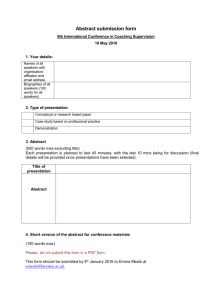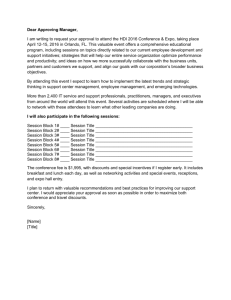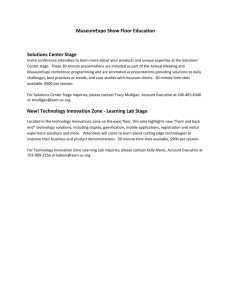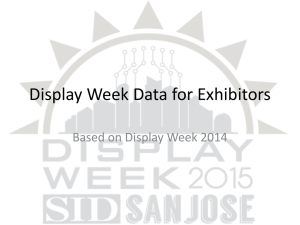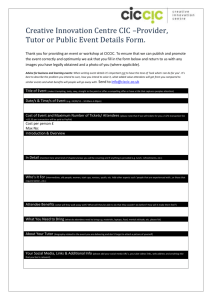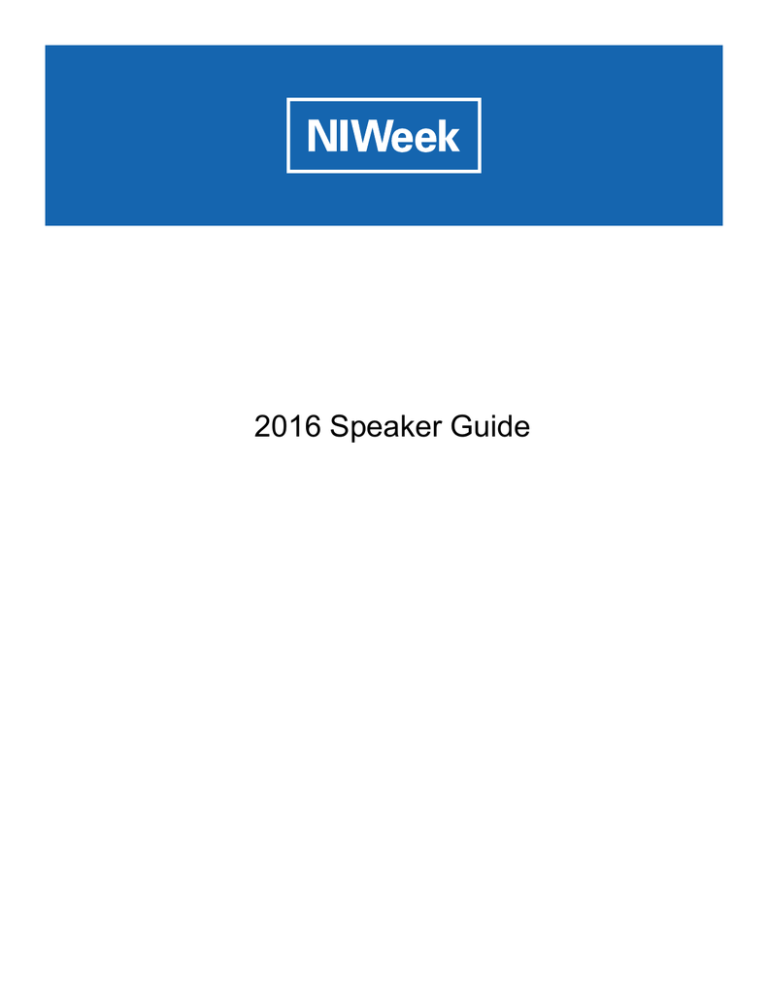
2016 Speaker Guide
NIWeek 2016, August 1–4
Contents
About NIWeek ........................................................................................................................................... 2
Speak at NIWeek....................................................................................................................................... 2
Past Speakers ........................................................................................................................................... 2
Submitting a Winning Session Title and Abstract .......................................................................... 2
Preferred Topics ....................................................................................................................................... 3
Commonly Accepted Abstracts Include ............................................................................................ 3
What You Can Expect ............................................................................................................................. 3
Format ......................................................................................................................................................... 4
Type of Sessions...................................................................................................................................... 4
Technical Levels....................................................................................................................................... 4
Special Events, Tracks, and Summit Areas ...................................................................................... 4
General NIWeek 2015 Audience Characteristics ............................................................................. 5
Type of Speakers ..................................................................................................................................... 5
Planning and Checklist........................................................................................................................... 5
As you prepare to submit a paper ....................................................................................................... 5
Once approved ......................................................................................................................................... 6
Best Practices ........................................................................................................................................... 6
Example Titles........................................................................................................................................... 6
Example Abstracts................................................................................................................................... 6
Example Biographies .............................................................................................................................. 7
Example Presentations........................................................................................................................... 7
Legal Guidelines....................................................................................................................................... 7
PowerPoint Tips ....................................................................................................................................... 7
Additional Tips.......................................................................................................................................... 7
FAQs ............................................................................................................................................................ 8
1|Page
NIWeek 2016, August 1–4
About NIWeek
NIWeek brings together more than 3,200 leading engineers and scientists across a spectrum of industries
to help them accelerate productivity for software-defined systems in test, measurement, and control. It is
the ultimate learning environment where attendees can explore how to develop applications faster,
smarter, and more cost-efficiently. More than 225 interactive technical sessions, case study
presentations, and panel discussions targeting skill levels from beginner to advanced developer can help
attendees learn how to optimize efficiency in their test and DAQ systems. They can also explore their
specific applications during hands-on labs.
Speak at NIWeek
The primary reason engineers and scientists attend NIWeek is to gain technical knowledge to help them
in their day-to-day careers. Have you found new ways to integrate NI technologies in your projects? Are
you improving your company’s efficiencies? Do you have ideas on where your industry is heading and
how your company will lead?
If so, we invite you to submit a paper. We are seeking the latest compelling content from customers,
partners, and NI employees. Sessions should be practical, given by a professional expert, focus on depth,
and incorporate interactivity or video demos when possible.
Past Speakers
Gary Xu, director of R&D at Samsung, presented “FD-MIMO and 3D Beamforming in the
Next-Generation Base Station.”
Ryan Welker, lead engineer with Integrated Test & Measurement, presented “Best Practices
for Powering, Mounting, and Enclosing Your CompactDAQ System.”
Tim Dykes, system architect with Viewpoint Systems, presented “CompactRIO Takes
Flight: Creating a Helicopter Autopilot.”
Submitting a Winning Session Title and Abstract
The Call for Papers closes on March 11, 2016 (Extended to April 15).
All abstracts must be written in English.
Abstracts should be submitted online via the Call for Papers submission portal here.
See the NIWeek 2015 online catalog to review last year’s session topics.
Think of a compelling and descriptive title that is 65 characters or less including spaces. Keep in
mind there are typically 15 competing sessions during a given time slot.
Abstracts can be up to 100 words and should describe what you will discuss if your paper is
accepted. If your paper is selected, we will work together to edit your abstract, which will be
viewable by registrants in the online catalog and mobile app.
Consider real-world examples or a demonstration to help engage attendees more. *See
“Preferred Topics” section.
You can submit background information with additional information but this is not required.
When using abbreviations or acronyms, spell out the full term or title the first time and then use
the abbreviation or acronym by itself.
2|Page
NIWeek 2016, August 1–4
If your paper is selected, be prepared to provide a biography and photo or your LinkedIn web
address. Also use the NIWeek 2016 PowerPoint template to develop your presentation. Provide
any additional supporting materials that will help the audience better understand your topic.
Preferred Topics
Software engineering in LabVIEW
o Real code examples you are willing to discuss including both triumphs and failures
o Code development best practices for stable, scalable applications
o Innovative architectural software designs you have deployed
o Designing advanced HMIs/GUIs in LabVIEW
o Techniques for managing large projects in LabVIEW
Applications that are pushing the boundaries of test and measurement
o Rugged, deployed embedded solutions
o High-channel-count acquisition and/or control systems
o Deployed grid measurement equipment
o AC electric device test (appliance, generator, motor, and so on)
o Machine vision’s role in the Internet of Things (IoT)
Data management
o Advanced data management techniques
o Using big data with IoT applications
o Metadata and file I/O best practices for DAQ
Commonly Accepted Abstracts Include:
Latest technologies and how to leverage them
Customer case studies
Time-saving tips from experts
How to avoid these common mistakes
How to gain a deeper understanding and maximize investments
Topics are rejected when they are not relevant to the audience or do not meet conference objectives.
What You Can Expect (See Extended Dates)
A technical committee composed of NI engineers will evaluate the submissions. You can expect to hear
from NI by March 31 (Extended to April 29) if your paper is accepted or declined. We will start
corresponding in February with authors of early submissions that are accepted. If your paper is accepted,
you will receive emails that offer helpful planning and training information along with important deadlines.
Log in to the Speaker Resource Center and complete the required deliverables. Be sure to bookmark the
SRC.
Key Deadlines
March 11 (Extended to April 15): Deadline to submit a paper.
March 31(Extended to April 29): Hear if paper is accepted or declined; Call for Papers closes.
February–March: Review the NIWeek 2016 Speaker Guide.
March 18–April 29: Review NI-edited version of your title and abstract.
April 1 (Extended to April 29): Download NIWeek PowerPoint template and use it when creating
your session presentation.
May–July: Attend preconference informational and training webcasts (also offered on demand).
April 1 (Extended to April 29): Finalize title, abstract, biography, photo, and contact information for
online catalog. Include additional materials that registrants can view prior to attending your
session that would help them better prepare.
July 11: Provide near final presentation.
July 29: Provide final presentation so it can be shared via the NIWeek mobile app and on
ni.com/niweekcommunity with attendees during the conference.
3|Page
NIWeek 2016, August 1–4
August 1: Review preregistrants and provide final presentation onsite in Speaker Center.
August 8: Review actual attendees and survey information.
Format
NIWeek brings some of the brightest minds together. As a technology expert, you can connect and help
fuel the growing NIWeek community. You can participate in NIWeek in a variety of ways, including the
keynote, exposition, networking opportunities, and technical sessions.
Type of Sessions
Most NIWeek sessions are technical. Some are hands-on labs or panels. Sessions should be one hour
long unless they are special events or the result of specific requests. Technical sessions involve lectures
by speakers who provide thought leadership, industry insight, and innovative practices. Some include
demonstrations.
Hands-on lab speakers invite attendees to participate at a station with hardware, software, and printed
manuals. Typically two people share a station and work through exercises. Assistants are available to
guide attendees so the speaker can focus on teaching.
Panels typically involve three to six speakers sharing their vision on a topic with the audience engaged
and asking questions.
Technical Levels
We offer four technical session levels: Introductory, Intermediate, Advanced, and Visionary. See the
below descriptions and examples to help you define the appropriate level for your paper.
Introductory: Features foundational concepts and first engagements with a topic and presents a highlevel introduction of technologies. NIWeek 2015 example: “Race to the Finish: Build an Automated Test
System in 40 Minutes”
Intermediate: Features best practices to improve efficiency and requires some familiarity with the topic;
expands on the foundations. NIWeek 2015 example: “A LabVIEW Consultant’s Guide to Faster
Development Using Free Tools”
Advanced: Features attendees who have extensive experience with the topic; they learn advanced best
practices from power users or area experts. NIWeek 2015 example: “DAQ Advanced: Digging Deep Into
NI-DAQmx Functions and Property Nodes”
Visionary: Features a discussion of an application or industry trends that impact the technology NI
develops and the way we work as engineers. NIWeek 2015 example: “Processing at the Edge: Why a
Platform-Based Approach Is Ideal for the IIoT”
Special Events, Tracks, and Summit Areas
Special Events
On Monday, August 1, NI hosts special events that are larger activities for a specific audience within the
conference. These audiences have particular learning objectives and expectations. The events include
the Academic Forum, Alliance Day, and the Build Your Own Embedded System hands-on workshop.
Alliance Day is a multitrack event reserved exclusively for NI Alliance Partners. It offers NI product and
technology updates, business best practice sharing, and networking opportunities.
The Academic Forum provides an exclusive platform for academic professionals to share best practices
in engineering education methodologies, discuss the future of engineering and research, and network
with colleagues from around the world.
4|Page
NIWeek 2016, August 1–4
Build Your Own Embedded System is a hands-on workshop where attendees develop an embedded
system with LabVIEW and C++ using NI reconfigurable I/O (RIO) hardware based on the Xilinx Zynq7000 All Programmable SoC. They receive an introduction to the LabVIEW RIO architecture with a
qualified NI instructor and experience building an FPGA-based embedded system that they get to take
home after the conference. This full-day workshop on Monday, August 1, requires an additional fee.
Learn more about the workshop at ni.com/build-your-own-embedded-system.
Tracks and Summits
NI hosts the main part of the conference, including 225 sessions across tracks and summits, August 2–4.
Tracks are generally more product specific and categorized into five key areas of customers including
Automated Test, Data Acquisition, and Software Techniques. Conference attendees have requested
more advanced sessions, so NIWeek 2016 has a track dedicated to this called Advanced Users.
This new advanced track offers the most technical, in-depth sessions for existing users. Attendees can
learn how to master the NI platform of hardware and software from LabVIEW Champions, who are the
most advanced NI platform users. From their years of experience, they will share advanced architectures,
insights, processes, and best practices to help accelerate productivity.
We also host six Summits that are specifically designed for key industries such as Aerospace and
Defense, Energy, RF, Semiconductor, Transportation and Vision. Attendees learn by hearing how
existing partners and customers within these industries apply technologies and best practices.
General NIWeek 2015 Audience Characteristics
Half attended a previous NIWeek
Average age was 39
More than half had a bachelor’s degree
In terms of degree discipline, more than half were in electrical and computer engineering; some
were in mechanical engineering, physics, and computer science
More than 30 percent have used NI technology for more than 10 years
Attend May Speaker Training to learn more about the audience characteristics.
Type of Speakers
Developer
Systems engineer
Principal engineer
Product marketing
Director or vice president of technology
Planning and Checklist
Having a plan will prepare you for the necessary steps, timelines, and resources to build an effective
presentation. Those speakers who allocate time to plan and prepare typically deliver more satisfactory
materials. Consider the following milestones.
As you prepare to submit a paper:
Define your session outcome—Include the skills that your attendees can gain by attending your
session. This should be in the abstract so registrants know exactly what they can learn at your
session.
Create the title and abstract (or description)—Strong titles feature less than 65 characters
including spaces. They are descriptive and appealing. Abstracts are summaries that include up to
100 words on the key areas you plan to discuss, who should attend, and the skills attendees can
gain from your session.
Define the technical level—See how NIWeek defines Introductory, Intermediate, and Advanced,
and select the option that best fits your paper.
5|Page
NIWeek 2016, August 1–4
Get familiar with NIWeek—If you haven’t attended NIWeek before, learn about the conference to
understand who attends and what they care about. Also see which areas are most important to
you to maximize what you can get out of the conference.
Consider other elements such as co-speakers (including another technology expert or partner)—
Perhaps you have a colleague who can speak on related aspects of your paper to make it more
interesting or technical. Or your company may be working with a partner and developing a
complete solution that features NI hardware or software.
Once approved:
Provide the speaker’s photo and biography—Attendees want to learn about you and your
experience. This information makes their experience more genuine.
Meet with your team or partners to expand on your session abstract or outline—Clearly define
roles, responsibilities, and deadlines. Agree to meet periodically to collaborate and rehearse your
presentation.
Consider which supporting materials, for example a white paper, video demo, or on-demand
webcast, could add value to your session and help attendees apply your concept.
Use the NIWeek PowerPoint template to build your presentation.
Consider collaborating with an NI point of contact or request one to discuss the topics you plan to
include in your session and which ones need special focus.
Attend preconference training to make your experience rewarding and session materials best in
class.
Make your travel arrangements and take advantage of what Austin offers.
Provide your final presentation so attendees can review it while at the conference.
Attend the on-site NIWeek Speaker Resource Center.
Best Practices
To help you make your paper top-notch, we provide best practice examples of session titles, abstracts,
biographies, and presentations. You may want to discuss your paper with an NI technical or marketing
leader to collaborate and make your session as valuable to attendees as possible. To get in touch with an
expert at NI, email presentations@ni.com.
Example Titles
The Future of Cooperative Heterogeneous Wireless Networks in 5G
How to Brew the Perfect Cup of Coffee With myRIO
5 Things You Didn’t Know You Could Do With a DAQ Device
Example Abstracts
Title and abstract from Aerospace and Defense Summit:
Passive and Active Radar Applications Using NI Equipment
Warsaw University of Technology (WUT) has extensive experience in radar technology R&D.
Over the last five years, WUT built many radar demonstrators using commercial off-the-shelf NI
equipment. This approach sped up the design process and reduced the costs significantly. At this
session, explore various applications of NI equipment for building several types of radar
demonstrators such as active radars for ground imaging using the synthetic-aperture radar (SAR)
technique, passive radars for moving target detection, and inverse SAR and passive SAR radars
for ground imaging.
Title and abstract from Data Acquisition Track:
Zero to Synchronized in 60 Minutes or Less
What do you do when one measurement system isn’t enough? With time-based synchronization,
you can expand your system across a wide area. NI has the tools to help, but understanding
which tool to use for each job can be overwhelming. At this session, start with the basics of timebased synchronization and the IEEE 1588-2008 Precision Time Protocol, learn the industrystandard method to measure your synchronization, and build up to more practical examples of
synchronized systems using the PXI-6683 timing and synchronization module.
6|Page
NIWeek 2016, August 1–4
Example Biographies
Gary Xu is a director of Research at Samsung Research America in Dallas. He leads a research
team on next-generation wireless communications system prototyping. He received his master’s
in electrical engineering from Rice University in 1999. Before joining Samsung, he was a principal
engineer at Nokia and Texas Instruments.
Timothy Dykes is a senior systems engineer and integrator with Platinum NI Alliance Partner
Viewpoint Systems in Rochester, NY. Within the Manufacturing Test and R&D Research
divisions, he architects, designs, and implements systems with a specialization in the aerospace
industry. Tim has extensive knowledge and expertise using multiple real-time and FPGA targets
synchronized for HIL and MIL testing as well as simulations.
Example Presentations
5 Tips to Modularize, Reuse, and Organize Your Development Chaos
Report Generation Methods From Toolkit to Template
Tips for Code Reuse: Bringing Your .dll, .m, and .mdl Files Into the LabVIEW Fold
Legal Guidelines
Do not use copyrighted or proprietary information.
Use “NI” instead of “National Instruments.”
Do not modify NI trademarks (ni.com/trademarks) and product names by making them plural or
possessive. For example, rewrite "LabVIEW’s multiplatform versions" as "multiplatform versions
of LabVIEW.”
PowerPoint Tips
Use the NIWeek PowerPoint template that is downloadable from the SRC. This template includes
guidelines for font type and size.
Keep in mind that your slides should supplement your presentation. Keep your presentation
interactive.
Proofread your slides.
Number your slides.
Use headline style capitalization for your slide titles: Capitalize all words except prepositions
less than four characters long and the articles “a,” “an,” and “the.”
Include only one topic per slide.
Follow the “six by six rule”: Include at the most six lines of text with six words per line on a slide.
Make sure presentation slides can be viewed even by those in the back of the session room.
Avoid paragraphs, use bullet points, capitalize the first letter after a bullet point, keep bullet
points concise, and do not use end punctuation in most cases.
Use active voice.
Choose either second or third person to use consistently throughout your slides.
Additional Tips
Provide your presentation the first day NIWeek kicks off; attendees want this material during the
conference.
During your session, give tips that attendees can immediately apply.
Share new information instead of something already available in a virtual event or white paper.
Mark your calendar, arrive early (minimum 15 minutes for setup), and allow time for Q&A.
Incorporate videos and other materials that make a presentation more interesting.
7|Page
NIWeek 2016, August 1–4
FAQs
When does the NIWeek 2016 Call for Papers close? March 11, 2016
Do I have to create an account? Yes, you’ll be prompted to create an ni.com account including an email
and password.
Where do I go to submit a paper? ni.com/niweek/call
When will I be notified if my paper is selected? By March 31 or sooner, depending on your submission
date.
How many papers can I submit? As many as you like.
Do speakers have to register? No, speakers are registered by the NI events team and receive free fullconference passes. Speakers pay for travel and hotel accommodations.
Can I invite a colleague to jointly present? Yes, we encourage this if it enhances the value of the
session materials.
How are topics selected? A group of NI technical marketing engineers spanning all technologies
reviews each submission on a weekly basis and discusses which topics support the conference strategic
objectives and best serve the audience.
If my topic is selected, can I collaborate with an NI technical marketing engineer to develop my
presentation? Yes, email presentations@ni.com and you will be put in contact with the appropriate NI
representative.
Do I need to use a presentation template? Yes, beginning April 1, you can log into the SRC to
download the template. All speakers should use the template.
What materials am I expected to provide to NI? When agreeing to speak at NIWeek, we expect you to
provide a session title and abstract by March 11; a speaker biography, contact information, and a photo
by April 4; and a near final presentation on July 11. If you intend to provide other helpful materials or have
special demo or room A/V requests, please email those to presentations@ni.com by July 11. Provide
your final presentation by July 29 via the online SRC or by August 1–2 at NIWeek at the on-site Speaker
Resource Center on the fourth floor of the Convention Center.
When will attendees be able to access my session materials? Any helpful, preliminary materials will
be available July 18–August 4, 2016. The session presentation will be available beginning August 1 and
indefinitely online.
Are all sessions shared online after the conference? Yes, NI wants to share these with attendees and
make them available to the public during the conference to add to the learning experience and provide
materials to those who are interested but unable to attend.
Do I have to share my session materials publically? No, if you have confidential information, please
do not check the Rights to Publish option when completing your Call for Papers application. If you did and
you want to change this, email presentations@ni.com.
When is scheduling available? The NIWeek 2016 online catalog will be available April 4, 2016.
When can I see who is registered for my session? The online SRC offers a lot of helpful information
including who is preregistered to attend your session. This will be visible in June.
Can I communicate with the attendees prior to the conference? Starting July 11, 2016, through the
mobile app, you can communicate with any registered attendee.
8|Page
NIWeek 2016, August 1–4
Do I need to bring my presentation to my session? Yes, please bring it on a USB drive.
Do I need to bring my laptop? Only for your personal use. Each session room will have a laptop.
Which room equipment is provided? A draped table with two chars, a laptop, a projector, a wide
screen, and two microphones are provided.
If I am giving a hands-on lab, whom do I work with on the equipment? In April, attend a planning
meeting with the NI DemoDogs. They will give you more specific information at this time. If you are an
external speaker, be sure to discuss your demo expectations with your area lead.
If I am giving a hands-on lab and have supporting materials, do I print them? Yes, by July 15, you
should print and deliver your materials to the DemoDogs. They will have the materials delivered to the
Austin Convention Center.
Will I see who actually attended my session? Yes, the week after NIWeek, you can log into the SRC
and review who attended your session. Names and company names will be provided but not contact
information.
Will I receive session feedback? Yes, we will encourage attendees to provide feedback via the mobile
app. Feedback will be available for you to review in the SRC the week after NIWeek.
©2016 National Instruments. All rights reserved. CompactRIO, LabVIEW, National Instruments, NI, ni.com, NI
CompactDAQ, NI-DAQ, and NIWeek are trademarks of National Instruments. Other product and company names
listed are trademarks or trade names of their respective companies. A National Instruments Alliance Partner is a
business entity independent from National Instruments and has no agency, partnership, or joint-venture relationship
with National Instruments.
9|Page

